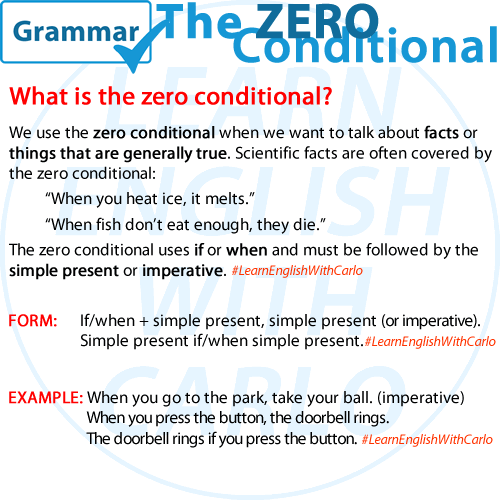What is the zero conditional?
The Zero Conditional is used to talk about general truths, scientific facts, and situations that are always true when the condition is met. This conditional helps us discuss facts that remain the same, regardless of time.
Example Sentences:
- If water reaches 100°C, it boils.
- If you mix red and blue, you get purple.
The outcomes are universally true in these cases, making the Zero Conditional ideal for describing rules and certainties. The zero conditional uses if or when and must be followed by the simple present or imperative.
Forming the Zero Conditional
The structure of the Zero Conditional is simple and consistent. Here’s the formula:
Alternative Form: Simple Present + if + Simple Present
Form: If + Simple Present, Simple Present
EXAMPLE:
When you go to the park, take your ball. (imperative)
When you press the button, the doorbell rings.
The doorbell rings if you press the button.
Using the Zero Conditional in Everyday Language
Here’s how we commonly use the Zero Conditional:
- To state facts and rules: If you touch fire, it burns.
- To explain habits: If I don’t set an alarm, I oversleep.
- To describe scientific truths: If iron rusts, it turns brown.
Practice Exercises
Try to create sentences using the Zero Conditional to talk about everyday truths and routines:
- If I drink coffee at night, I ___________.
- Ice ___________ if you leave it in the sun.
- If the phone battery dies, it ___________.
Summary
The Zero Conditional is essential for talking about things that are generally or always true. With its simple form and straightforward usage, it’s an easy and practical way to express known facts and reliable outcomes.

FAQs About the Zero Conditional
1. When do we use the Zero Conditional?
We use the Zero Conditional to talk about general truths, scientific facts, habits, and situations that are always true when a specific condition is met. It’s perfect for explaining things that don’t change over time.
2. What is the structure of the Zero Conditional?
The structure is straightforward:
- If + simple present, simple present
For example: If it rains, the ground gets wet.
3. Can I reverse the clauses in the Zero Conditional?
Yes, you can! Reversing the clauses does not change the meaning. However, remember to drop the comma if the “if” clause comes second.
- If water reaches 100°C, it boils.
- Water boils if it reaches 100°C.
4. Can I use “when” instead of “if” in the Zero Conditional?
Yes, “when” is often interchangeable with “if” in the Zero Conditional, especially when talking about something that always happens.
- If you heat ice, it melts.
- When you heat ice, it melts.
5. What’s the difference between the Zero and First Conditionals?
The Zero Conditional talks about general truths or predictable results (e.g., If you mix red and blue, you get purple). The First Conditional discusses specific future possibilities or likely events (e.g., If it rains tomorrow, we will cancel the picnic).
6. Can I use the Zero Conditional for advice?
Not usually. The Zero Conditional is more suited to general truths or scientific facts. For advice, the First Conditional is often more appropriate (e.g., If you study, you will pass the test).
